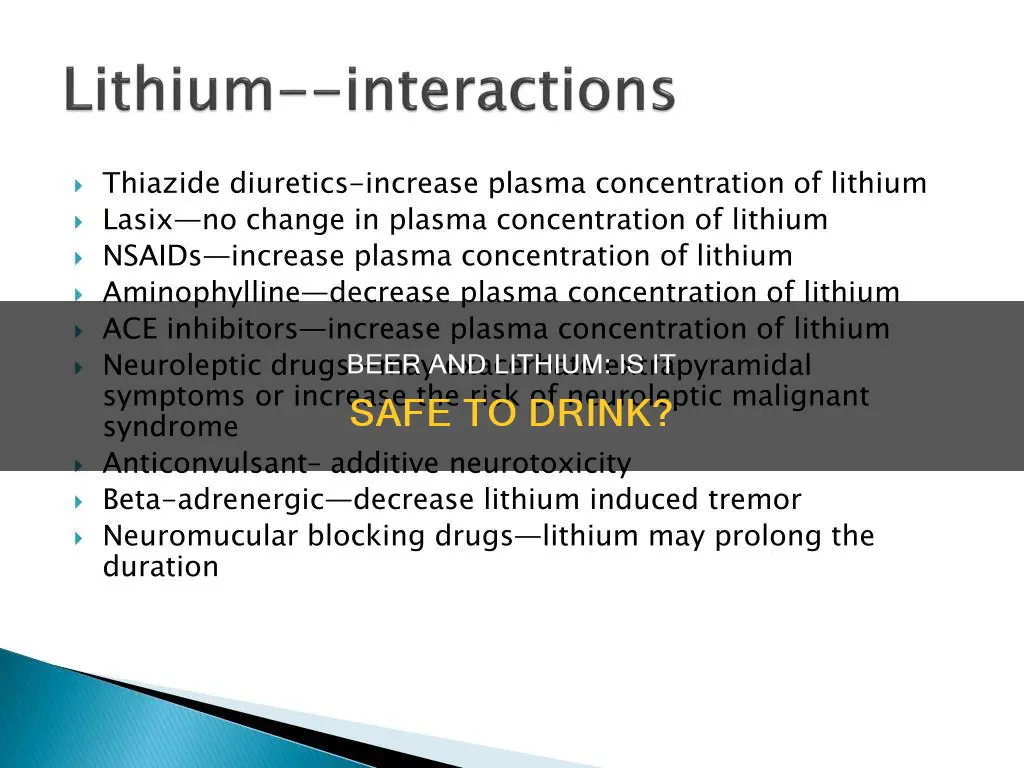
Drinking alcohol while taking lithium can cause serious side effects and health complications. Doctors advise against consuming alcohol while taking lithium, a medication prescribed for bipolar disorder and other affective disorders. Alcohol can worsen the medication's sedating side effects, such as drowsiness, and may reduce its effectiveness in treating bipolar disorder. In severe cases, combining lithium and alcohol can lead to dehydration and lithium toxicity, which can be life-threatening. It is crucial to consult a healthcare provider before consuming alcohol when taking lithium, as individual risks may vary based on factors like age and medical history.
| Characteristics | Values |
|---|---|
| Effect on bipolar disorder symptoms | Alcohol can worsen bipolar disorder symptoms |
| Effect on medication benefits | Alcohol may lessen the benefits of lithium |
| Effect on lithium side effects | Alcohol can intensify the side effects of lithium, including sedation, dizziness, drowsiness, and difficulty concentrating |
| Risk of dehydration | Drinking alcohol with lithium can lead to dehydration, which can cause lithium toxicity |
| Risk of lithium toxicity | Combining alcohol and lithium can lead to lithium toxicity, which can be life-threatening |
| Risk factors | Age, medical history, and other medications can affect the risks of combining alcohol and lithium |
| Safe amount of alcohol | There is no amount of alcohol that is completely safe to drink while taking lithium |
| Advice | Discuss the risks with a healthcare provider before combining alcohol and lithium |
What You'll Learn
- Drinking alcohol while taking lithium can lead to dehydration and lithium toxicity
- Combining alcohol and lithium can increase the risk of side effects
- Drinking alcohol while taking lithium can negatively impact your mental health and well-being
- Alcohol can reduce the benefits of lithium
- Drinking alcohol while taking lithium can increase the risk of developing an alcohol use disorder

Drinking alcohol while taking lithium can lead to dehydration and lithium toxicity
Drinking alcohol while taking lithium can have serious health consequences. Both substances affect the central nervous system and have opposing effects on behavioural circadian rhythms. This means that drinking alcohol while taking lithium can worsen the medication's sedating side effects, such as dizziness and drowsiness, and may even lessen the benefits of the medication.
The combination of alcohol and lithium can also adversely affect sleep and circadian rhythms, which may worsen symptoms of bipolar disorder. Moreover, alcohol can dehydrate the body, increasing the amount of lithium in the blood to dangerous levels, a condition known as lithium toxicity.
Lithium toxicity is a life-threatening emergency that requires immediate medical attention. Symptoms of lithium toxicity include:
- Feeling very lightheaded or drowsy
- Extreme confusion or blackouts
- Urinating large amounts of diluted urine
- Ringing in the ears (tinnitus)
- Muscle weakness or twitches
- Vomiting or diarrhoea that doesn’t stop
It is important to note that there is no amount of alcohol that is completely safe to drink while taking lithium. If you are taking lithium, it is best to avoid drinking alcohol altogether. If you have any questions or concerns, be sure to talk to your doctor or pharmacist.
Beer and Baby Gas: Is There a Link?
You may want to see also

Combining alcohol and lithium can increase the risk of side effects
Combining alcohol and lithium can have adverse effects on your health. Both substances affect the central nervous system, altering your mood and causing sedation. Therefore, taking them together can increase the intensity of lithium's side effects, such as drowsiness, dizziness, and impaired thinking and judgment. This heightened sedation can pose a danger when performing activities that require concentration, such as driving or operating machinery.
Additionally, alcohol can reduce the benefits of lithium as a medication for bipolar disorder. Bipolar disorder involves episodes of depression, mania, or both. As a mood stabilizer, lithium helps control emotions and reduce the risk of suicide in patients with mood disorders. However, alcohol can worsen bipolar symptoms and increase the likelihood of side effects, making it more challenging to manage the condition.
Consuming alcohol while taking lithium can also lead to dehydration, which can cause a dangerous increase in lithium levels in the blood, known as lithium toxicity. This condition can be life-threatening and requires immediate medical attention. It is worth noting that lithium has a narrow therapeutic index, meaning even a small change in dosage can have significant effects. Therefore, it is crucial to avoid alcohol consumption during the first few days of taking lithium or when your dosage is increased.
Furthermore, combining alcohol and lithium can increase the risk of developing an alcohol use disorder (AUD) and negatively impact thyroid levels, increasing the risk of hypothyroidism. It is important to note that the combination may also worsen alcohol withdrawal symptoms and increase the risk of a dual diagnosis, where an individual has both a mental health illness and a substance use disorder.
Beer Consumption: What's Safe to Drink?
You may want to see also

Drinking alcohol while taking lithium can negatively impact your mental health and well-being
Secondly, alcohol can intensify the side effects of lithium. Both substances have sedative effects, so consuming them together can lead to increased drowsiness, dizziness, and impaired thinking and judgment. This combination can pose a danger when performing tasks that require concentration, such as driving or operating machinery. Additionally, alcohol can negatively impact sleep and circadian rhythms, further affecting your mental well-being.
In severe cases, mixing alcohol and lithium can lead to dehydration and lithium toxicity, a potentially life-threatening complication. This occurs because dehydration causes the body to retain lithium for longer, leading to dangerously high levels in the blood. It is crucial to discuss the risks of combining alcohol and lithium with your healthcare provider, as the specific dangers may vary depending on your age, medical history, and other medications you are taking.
Overall, it is generally advised to avoid consuming alcohol while taking lithium to prevent negative impacts on your mental health and well-being.
Beer Before Bed: Why You Can't Sleep
You may want to see also

Alcohol can reduce the benefits of lithium
Lithium is a medication that treats bipolar disorder, a condition that involves episodes of depression, mania, or both. Bipolar disorder is a mental health condition where people experience drastic mood swings that cycle between periods of low moods (depression) and episodes of high moods (mania). While the way this medication works is not fully understood, researchers believe lithium may boost levels of certain chemicals, such as serotonin, in the brain.
The National Alliance on Mental Illness (NAMI) warns that consuming alcohol while taking lithium can reduce the benefits of bipolar disorder medication. This is because alcohol and lithium have opposing effects on behavioural circadian rhythms, which are body processes such as sleep that follow a 24-hour cycle in response to light and dark. As a result, drinking alcohol and taking lithium may adversely affect sleep and circadian rhythms, which may worsen symptoms of bipolar disorder.
Additionally, alcohol may increase the side effects of lithium. For example, both lithium and alcohol cause sedation, so taking them together can increase drowsiness, which can pose a danger when driving or operating machinery. Alcohol can also worsen or exacerbate the common side effects of lithium, including dizziness or drowsiness, thinning of hair or hair loss, and increased thirst and urination.
In severe cases, combining lithium and alcohol can lead to dehydration and lithium toxicity, which is a potentially life-threatening complication. This is because drinking too much alcohol can result in dehydration, which can cause blood levels of lithium to become dangerously high. Therefore, it is important to discuss the interaction between alcohol and lithium with a healthcare provider before consuming any alcohol while taking lithium.
Drinking Beer While Taking Cardizem and Ceftin: What's the Verdict?
You may want to see also

Drinking alcohol while taking lithium can increase the risk of developing an alcohol use disorder
Drinking alcohol while taking lithium can have serious consequences for your health. Both substances affect the central nervous system and have opposing effects on behavioural circadian rhythms, which govern body processes such as sleep. As such, combining the two can adversely affect sleep and circadian rhythms, which may worsen the symptoms of bipolar disorder.
The side effects of lithium may be intensified by alcohol, and the benefits of the medication may be reduced. These intensified side effects include:
- Dizziness
- Drowsiness
- Lack of coordination
- Nausea and vomiting
- Unsteadiness when standing or walking
- Diabetes insipidus
- Kidney problems
- Hypothyroidism
In addition, drinking alcohol while taking lithium can lead to dehydration and lithium toxicity, which can be life-threatening. This is because lithium is removed from the body by the kidneys, and dehydration causes the kidneys to retain lithium for longer than usual.
Mixing lithium and alcohol can also increase the risk of mental health issues and other complications, including an increased risk of developing an alcohol use disorder (AUD). Research suggests that people with bipolar disorder are more likely to experience AUD, and that AUD can cause people to develop bipolar disorder at a younger age.
Beer and Antibiotics: Is It Safe to Drink?
You may want to see also
Frequently asked questions
Doctors advise against drinking alcohol while taking lithium. Alcohol can increase the nervous system side effects of lithium, such as dizziness and drowsiness, and can impair your thinking and judgement.
Combining alcohol with lithium can intensify the medication's sedating side effects, such as drowsiness, and may lessen its benefits. In severe cases, it can lead to dehydration and lithium toxicity, which can be life-threatening.
There is no amount of alcohol that is completely safe to drink while taking lithium. Even small amounts of alcohol can worsen the symptoms of bipolar disorder.
Drinking alcohol can dehydrate the body, increasing the amount of lithium in the blood to toxic levels. This is because lithium is removed from the body by the kidneys, and when dehydrated, the kidneys hold on to lithium longer than usual.
Symptoms of lithium toxicity include feeling very lightheaded or drowsy, extreme confusion or blackouts, urinating large amounts of diluted urine, ringing in the ears, muscle weakness or twitches, and vomiting or diarrhoea that doesn't stop. Lithium toxicity is a medical emergency and requires immediate medical attention.







